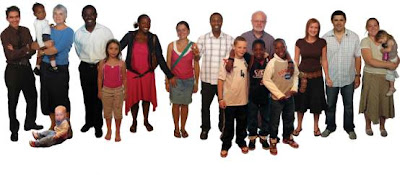 "Sunday morning is the most segregated time in America".
"Sunday morning is the most segregated time in America". Much has been said of Obama and Jeremiah Wright and the Trinity United Church of Christ. He was a member of this church for 20 years--its pastor married him, baptized his children, and played a key role in his conversion to Christianity. This is a significant accomplishment considering that he was raised at least in part by a mother who was skeptical of organized religion and imparted no particular religious belief to her son. The church obviously played a large part in helping Obama come to terms with himself, his beliefs, and his ideals. This being the case, the teachings of the church are worth checking out.
The church advertises a 10 point vision:
A congregation committed to ADORATION.
A congregation preaching SALVATION.
A congregation actively seeking RECONCILIATION
A congregation with a non-negotiable COMMITMENT TO AFRICA.
A congregation committed to BIBLICAL EDUCATION.
A congregation committed to CULTURAL EDUCATION.
A congregation committed to the HISTORICAL EDUCATION OF AFRICAN PEOPLE IN DIASPORA.
A congregation committed to LIBERATION.
A congregation committed to RESTORATION.
A congregation working towards ECONOMIC PARITY.
The focus of today is liberation--specifically Black Liberation Theology as taught by James H. Cone.
This theology asserts that Christian theology is a theology of liberation. It frames God's actions in the context of the oppressed--specifically their plight for liberation and claims that liberation is not just consistent with the gospel of Jesus Christ, but rather, it is the gospel of Jesus Christ. It expounds upon the peoples of the Old and New Testaments and revises the telling of their histories with an understanding of this liberation. It glorifies the oppressed. It asserts that God's work is to liberate the oppressed--blacks in this case, but it could be American Indians, Jews, the poor, etc. It does not acknowledge the belief that God's work is to bring to pass the immortality and eternal life of man. It blames whites for the modern day oppression of blacks. It vilifies whites for all that is wrong in the world.
Black liberation theology is not so much a religion unto itself as much as it is an understanding of, or reading of Christianity. (This doesn't quite capture the essence, but go with me for a moment...) Like one might perform a deconstructionist reading of the Constitution, a Christian might understand Christianity in the context of liberation, or black liberation. Theology has been described as a reasoned discourse on religion or spirituality. Theologians might use various forms of analysis and argument to help understand, explain, or defend any religious topic. In this case, Christianity is understood or explained from a black liberation point of view. It reminds the student of "the philosophies of men, mingled with scripture". Granting the benefit of doubt, it must be assumed that the theologian truly believes that which is defended or asserted. Likely, this comes from a deep and earnest desire to juxtapose that which is personally unacceptable, with that which is known or feared to be true. In the end, a kind and loving God is sought for. It is unfathomable that a caring, loving God would allow the suffering of such a group, therefore, a God who seeks for their liberation is philosophically created in order to put an end to the mental turmoil the alternative presents. In so doing, a God who favors one group over another is created, thus presenting the same void of love and concern for the formerly favored majority. Some how, a God who loves all equally cannot be accepted as this would require the acceptance of suffering and oppression.
This philosophy is rooted in James Cohn's book, so its examination is seemingly in order. Here are some direct quotes:
"We have reached our limit of tolerance, and if it means death with dignity, or life with humiliation, we choose the former. And if that is the choice, we will take some honkies with us." (pg 42)
"Black theology rejects the tendency of classical Christianity to appeal to divine providence. To suggest that black suffering is consistent with the knowledge and will of God and that in the end everything will happen for the good of those who love God is unacceptable to black people. The eschatological promise of heaven is insufficient to account for the earthly pain of black suffering. We cannot accept a God who inflicts or tolerates black suffering for some inscrutable purpose." (pg 44)
"White theologians, not having felt the sting of oppression will find it most difficult to criticize this nation for the condemnation of America means the condemnation of self. The true black thinker is in a different position. He cannot be black and be identified with the powers that be. To be black is to be committed to destroying everything this country loves and adores." (pg 49)
"The black experience is the feeling one has when he strikes against the enemy of black humanity by throwing a live molotov cocktail into a white-owned building and watching it go up in flames. We know, of course, that there is more to getting rid of evil than burning buildings, but one must start somewhere." (pg 56)
to be continued...
1 comment:
Hmm...There's a lot I could say, but finding a starting point is difficult without making this comment twice as long as your post.
How about this: I enjoy the massive amount of information you present in your blog. It makes me think; mostly about moving my family to Iceland.
Post a Comment